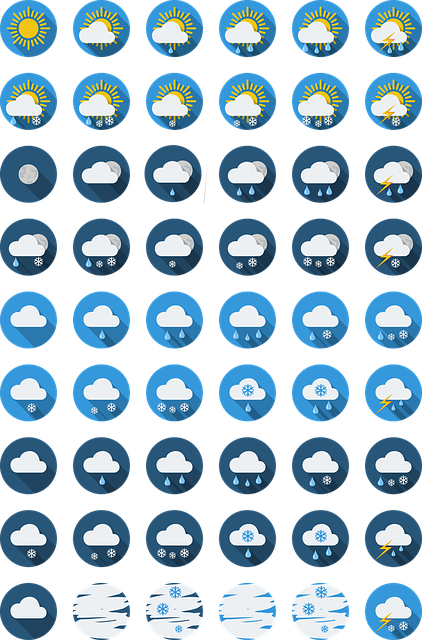Karachi, Pakistan's economic hub, faces diverse extreme weather events due to its coastal location, including heatwaves and monsoon floods. Historical data reveals increasing frequency of these events, necessitating enhanced preparedness from authorities and residents. This involves understanding weather patterns, implementing early warning systems, strengthening infrastructure, community awareness campaigns, and proactive contingency planning. Effective strategies like regular drills, clear communication, designated safe zones, and community engagement can minimize losses and boost Karachi's resilience against extreme weather conditions.
Karachi, Pakistan’s bustling metropolis, is increasingly vulnerable to weather extremes exacerbated by climate change. This article delves into Karachi’s historical weather patterns, identifying potential extreme events like floods and heatwaves. It assesses infrastructure resilience, evaluating current preparedness measures against a backdrop of growing risks. Community awareness and education are highlighted as essential foundations for mitigating impacts. Moreover, it offers strategic insights into developing a robust action plan to ensure effective response and resilience in the face of these challenges unique to Karachi.
- Understanding Karachi's Weather Patterns: A Historical Perspective
- Identifying Potential Extreme Weather Events in the Region
- Assessing Infrastructure Resilience and Preparedness Measures
- Community Awareness and Education: An Essential Cornerstone
- Developing a Comprehensive Action Plan for Effective Response
Understanding Karachi's Weather Patterns: A Historical Perspective

Karachi, Pakistan’s economic hub, experiences distinct weather patterns throughout the year, making it crucial to understand historical climate trends for effective preparedness against weather extremes. The city’s geography, situated along the Arabian Sea, influences its climate, characterized by hot summers and mild winters. Historical data reveals that Karachi has faced intense heatwaves, with temperatures exceeding 45°C, posing significant health risks. Moreover, monsoons bring heavy rainfall, sometimes leading to floods, highlighting the need for robust drainage systems and infrastructure.
A historical perspective shows that extreme weather events in Karachi have increased in frequency and intensity over the past few decades. Heatwaves have become more severe, and monsoon seasons have brought unpredicable rainfall, causing disruptions. Understanding these patterns is essential for authorities and residents to enhance preparedness measures, ensuring the city’s resilience against future climate challenges.
Identifying Potential Extreme Weather Events in the Region

Karachi, as a coastal metropolis, is particularly vulnerable to a range of extreme weather events due to its unique geographical location. Identifying potential threats is a critical step in building resilience and ensuring the safety of residents. Historical data analysis reveals that the region frequently experiences intense rainfall, leading to flash floods, especially during the monsoon seasons. Additionally, Karachi is at risk from cyclones and tropical storms that can cause significant damage along the coastline. Heatwaves are another concern, with rising temperatures posing health risks to the population.
Understanding these weather patterns and their frequency is essential for effective preparedness. Local meteorological departments play a pivotal role in monitoring and forecasting such events, enabling authorities and residents to take proactive measures. Early warning systems and public awareness campaigns can significantly mitigate the impact of extreme weather in urban areas like Karachi, ensuring a more prepared and resilient community.
Assessing Infrastructure Resilience and Preparedness Measures

Karachi, as a bustling metropolis, faces unique challenges when it comes to weather extremes. Assessing infrastructure resilience is a critical step in preparing for potential disasters. This includes evaluating the strength and maintenance of critical structures such as bridges, roads, and power lines, which play a vital role in emergency response and relief efforts. Regular inspections and robust maintenance programs can significantly enhance the city’s preparedness.
Measures like implementing modern construction techniques, retrofitting older structures to withstand extreme weather events, and integrating early warning systems are essential. Karachi can also benefit from developing comprehensive contingency plans that involve collaboration between local authorities, emergency services, and community groups. These proactive steps will ensure a more resilient and responsive city in the face of severe weather conditions.
Community Awareness and Education: An Essential Cornerstone

In Karachi, as in many urban centers facing climate change, community awareness and education are an essential cornerstone for evaluating preparedness against weather extremes. It’s crucial to equip citizens with knowledge about potential hazards, such as intense rainfall, heatwaves, and cyclones, and empower them to take proactive measures. Regular public outreach programs, workshops, and training sessions can help foster a culture of resilience where everyone understands their role in mitigating risks and responding effectively during emergencies.
Educational initiatives should cover topics like recognizing early warning signs, preparing emergency kits, securing homes, and implementing community-based disaster response plans. By enhancing awareness, communities in Karachi become better equipped to anticipate, prepare for, and recover from severe weather events, ultimately saving lives and minimizing damage.
Developing a Comprehensive Action Plan for Effective Response

In Karachi, where weather extremes can be particularly severe, developing a comprehensive action plan is vital for effective response and mitigation. This involves a multi-step process that begins with assessing potential risks specific to the region, such as heavy rainfall, heatwaves, or cyclones. Once identified, these risks should trigger tailored strategies, including regular drills and training sessions for all residents and emergency services.
A robust action plan must also encompass clear communication channels and community engagement. This ensures everyone knows what to do before, during, and after an extreme weather event. Utilizing local media, social networks, and community leaders can help disseminate critical information swiftly. Furthermore, establishing designated safe zones and evacuation routes in advance facilitates a more organized and efficient response, ultimately minimizing potential losses and enhancing the overall resilience of Karachi’s population.
Karachi, as a bustling metropolis, must confront the challenges posed by weather extremes. By understanding historical weather patterns, identifying potential threats, and enhancing infrastructure resilience, the city can better prepare for future storms. Community education plays a pivotal role in fostering awareness and ensuring swift responses during emergencies. Developing an all-encompassing action plan that integrates these strategies is crucial to safeguard lives, property, and the overall well-being of Karachi’s residents. This proactive approach will enable the city to navigate weather extremes effectively and build a more resilient future.
